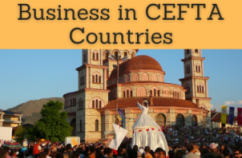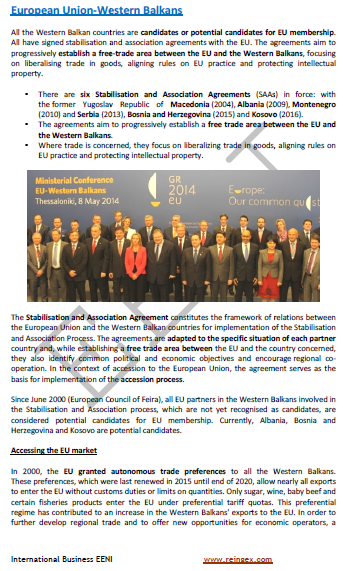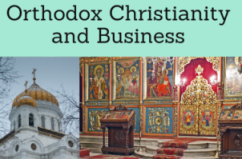
Business in Albania, Tirana, Albanian Economy
Albanian Foreign Trade. Albania: third producer of chromium in the world
- Introduction to the Republic of Albania (Southeast Europe)
- Albanian Economy: The third chromium producer in the world
- Business in Tirana
- Albanian Foreign Trade
- Investment in Albania
- Access to the Albanian Market
- Business Plan for Albania
The objectives of the subject “International Trade and Business in” Albania” are the following:
- To analyze the Albanian Economy and Global Trade
- To know the trade opportunities in the Albanian market
- To analyze the trade relations of Albania with the country of the student
- To know the Albanian Trade Agreements
- To develop a business plan for Albanian Market

The Subject “Foreign Trade and Business in Albania” belongs to the following Online Programs taught by EENI Global Business School:
Masters: International Business, Foreign Trade.
 Masters adapted to Albanian Students.
Masters adapted to Albanian Students.
Languages:  +
+  Albania
Albania  Albanie
Albanie  Albânia.
Albânia.
- Credits of the Subject “Doing Business in Albania”: 1

- Duration: one week

International Trade and Business in Albania

Albanian Preferential Access and Trade Agreements:
- Albania and the Central Eurasian Economic Area
- Central European Free Trade Agreement (CEFTA)
- Black Sea Economic Cooperation
- Central European Initiative
- Adriatic-Ionian Initiative
- RCC
- Albania has not ratified the framework agreement of the Trade Preferential System (TPS-OIC)
- Albania-Turkey Agreement
- Albania-EFTA Agreement
- Albania-EU Stabilization and Accession Agreement


- WTO
- Agreement on Sanitary and Phytosanitary Measures
- Agreement on Trade in Services (GATS)
- Agreement on Technical Barriers to Trade
- Agreement on Preshipment Inspection
- Agreement on Safeguards
- Trade Facilitation Agreement
- WCO
- Kyoto Convention
- Convention on the Harmonization of Frontier Controls of Goods
- CMR Convention (UN)
- COTIF Convention
- BIC
- Chicago Convention (ICAO)
- IMO
- Convention for Safe Containers
- Istanbul Convention
- Customs Convention on Containers - not a member
- Organization for Cooperation between Railways (OSJD)
- CIM, CIT Rail Rules
- Hamburg Rules
- IRU
- TIR Convention
- Guidelines on Safe Load Securing for Road Transport
- ICC

European Trade and Economic Organizations of Albania
- UNECE
- OSCE

- Organization of Islamic Cooperation (OCI)
- Islamic Development Bank
- Albania is beneficiary of the Arab Development Funds
Global Organizations:
- UN
- WB
- IMF
- Capital of Albania: Tirana
- Official Language: Albanian
- Area of Albania: 28,748 km²
- Albanian Population: 2.7 million people
- Type of Government: Parliamentary Republic
- Borders of Albania: Greece, Montenegro, Kosovo and the Republic of Macedonia
- Independence of Albania: 1912 (Ottoman Empire)
- In 1991, the Socialist Republic of Albania became the Republic of Albania
Religion in Albania:
-
Islam (Sunnis): 79%
- Albania has signed the Cairo Declaration on Human Rights in Islam
- Fiqh (Islamic Jurisprudence): Fiqh-al-Hanafi
- Orthodoxy (Christianity)

Albania, despite being an European country, we will also assign to the Islamic Civilization (Central Eurasian Economic Area).

Albanian Economy.
- The Republic of Albania is a transition Economy
- During the communist period, Albania was the most closed and planned country of all, and its effects are still remarkable
- The organized crime and corruption is a serious problem in Albania
- Albanian GDP (nominal): 30,660 million dollars
- GDP per capita: 11,885 dollars
- Currency of Albania: Albanian Lek
- Albania has the largest oil reserves (on land) in Europe
- Albania is the third world chromium producer (10% of the world's total)
- Mining: 40% of the Albanian GDP
- Entry of foreign investment in sectors such as energy and Transport infrastructures
- The main sectors of the Albanian Economy are agriculture, food processing, wood, petroleum, cement, chemical products, mining, base metals, hydroelectric power, tourism, textile industry, and footwear
- Albania is rich in natural resources, has valuable copper, iron and nickel mines
- Albania requested accession to the EU in 2009 (EU Enlargement)

Albanian Foreign Trade.
- Albanian exports have increased by 300%
- The main Albanian exports are textiles and footwear, asphalt, metals and metal minerals, petroleum, vegetables, fruits, and tobacco
- Top Albanian exports destinations are Italy (43%), Kosovo, the U.S., and China
- The main Albanian imports are machinery, food products, textiles, and chemical products
- The main suppliers of Albania are Italy (33%), China, Greece, and Turkey
(c) EENI Global Business School (1995-2024)
We do not use cookies
Top of this page



